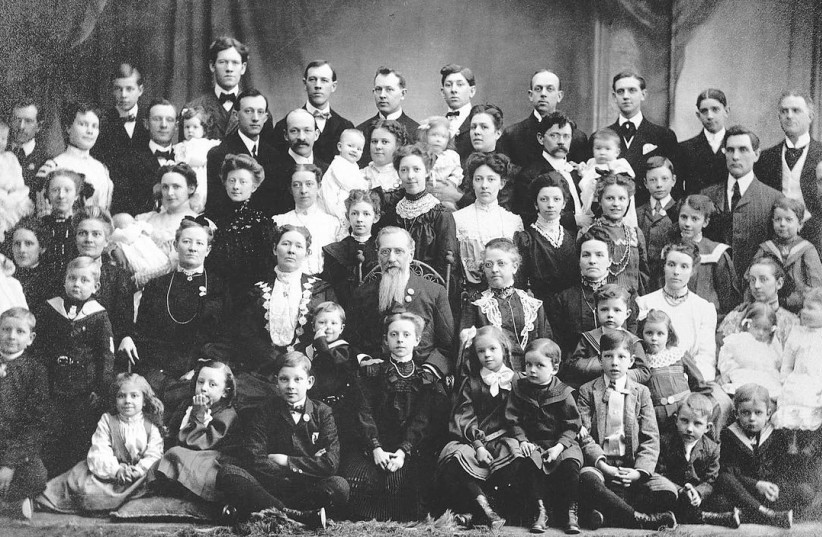Polygamy and polyamory are two similarly-sounding relationship styles that people often confuse. But, contrary to the common misconception, they are not the same. What then, are the key differences between the two?
Polyamory is simply the idea of consensual non-monogamy. This can manifest in a number of different formats, some of which may be casual free love, like an open relationship, or a more solidified group partnership. All in all, the practice of polyamory is fluid and not rigidly defined, and exactly how it can manifest can vary from person-to-person.
Polygamy is different, specifically about being married to more than one person at the same time.
Usually, this is seen in the form of polygyny, which is when someone, usually a male but not always, is married to several women. The inverse of this is polyandry, where someone, usually a woman, is married to several men. This is less common for several reasons, such as questions of parentage. It is most often associated with Tibet and India, where it has been practiced for centuries for a number of cultural and religious reasons.
Both polygamy and polyamory are practiced around the world, and while they are far from the norm, both are still very prevalent. However, their legality varies depending on where you are.
So what is the point of polygamy? Where is it legal? What do the Bible and other religions say about it?
Here's everything you should know.

Why is polygamy illegal?
Polygamy has been outlawed in most countries - with polyandry being practically completely outlawed.
The United Nations Human Rights Committee has also long urged all countries to fully abolish the practice. This is because, according to the UN, polygamy undermines the freedom of women to marry who they wish with free and full consent.
"Polygamy violates the dignity of women. It is an inadmissible discrimination against women. Consequently, it should be definitely abolished wherever it continues to exist," the UN Human Rights Committee Comment 28 states.
"Polygamy violates the dignity of women. It is an inadmissible discrimination against women. Consequently, it should be definitely abolished wherever it continues to exist."
UN Human Rights Committee Comment 28
Furthermore, polygamy is also seen as being unfair and cruel to women because it often leads to inequality between the sexes. It can also lead to some wives being favored over others, with some being treated poorly, which can lead to serious physical and mental strain.
Around the world, many places that criminalize polygamy do so under the label of bigamy, which refers to simply marrying another person.
Where is polygamy legal?
Polygamy is legal in several places, most notably in heavily Muslim countries and in parts of Sub-Saharan Africa known as the "polygamy belt."
In Africa in particular, polygamy is especially prevalent due to how rooted it is in traditional culture as well as in Islam. The countries with the most polygamy are all on the African continent, specifically Niger, Mali, Burkina Faso, Nigeria and the Gambia.
It is also notable that in many places, the form of polygamy that is recognized is meant for specific religious or ethnic groups. For example, in South Africa, polygamy is legal for Muslims and for some indigenous peoples like Bantu and Zulu peoples. This is notable because Jacob Zuma, who was president of South Africa until 2018, is a noted polygamist in line with his Zulu culture and has four wives.

Polygamy is most frequently seen practiced in Muslim countries or those with large Muslim populations.
A good example of this is India, the second-largest country in the world. Here, polygamy has been banned for a long time, with the exception of the country's large Muslim population, who are allowed to marry multiple wives in accordance with Islamic law.
Is polygamy legal in Israel?
Technically, no. However, the actual truth is more complicated.
Israel forbids polygamy explicitly, and the country's marriage laws are backed by religious rulings. However, there are still two circumstances in which polygamy in Israel is possible.
The first and far more commonly known one is polygamy among the Bedouins in Israel's South. Here, polygamy is routinely practiced and men can have more than one wife. This is technically illegal but is typically overlooked by the state. However, efforts have been made in recent years to crack down on polygamy.
In fact, some Bedouins in Israel have even been convicted for polygamy.
The second way that polygamy in Israel is possible is somewhat more unusual. In this case, a Jewish man is technically allowed to marry a second wife in a very specific circumstance when he tries to give his first wife a get (a Jewish divorce document) but she refuses. Should this happen, the man can seek approval from the rabbinic courts and can get another wife, despite still being married – and living separately – from his first wife. This practice is called heter meah rabbanim and requires the approval of 100 rabbis.

One recent example of this happening in Israel was with the case of Israeli haredi (ultra-Orthodox) actor Shuli Rand, who in 2021 married actress Tzufit Grant. This is despite Rand still being married, having split from his wife, Michal Rand, in 2016 without his get ever being accepted.
In this case, Rand reportedly received an exemption signed by 100 rabbis that allowed him to remarry.
Though Rand may be one of the highest-profile examples of this happening, he isn't alone. According to the Center for Women’s Justice legal department head Nitzan Caspi Shiloni, around 15 exemptions of this nature are approved every year out of around 80 requests submitted, allowing married Jewish Israeli men to get married to another wife.
This is a policy that is fraught with controversy, as it reflects both a serious level of inequality in Jewish law about marriage – if a woman is never granted a get, she is strictly forbidden to remarry and is thus labeled an agunah, a chained woman, with little to no recourse, and any children she should have with another man will be considered mamzerim – illegitimate. This also demonstrates inequality between religions in Israel, since Muslims and Christians are not able to take on a second wife in this manner.
In fact, Rand's celebrity status likely didn't contribute much to this, with the women's organization Mavoi Satum writing: “Shuli was given a permit to marry another wife by the Rabbinical Court, not because he is well known or above the law, but simply because according to Halacha [Jewish law], it is allowed to give him the permit. Men are allowed. For women, it is forbidden.”
“Shuli was given a permit to marry another wife by the Rabbinical Court not because he is well known or above the law, but simply because according to Halacha [Jewish law], it is allowed to give him the permit. Men are allowed. For women, it is forbidden.”
Mavoi Sutam
Rand himself commented on the controversy back in 2020, before he officially received permission. Speaking to Channel 13, he said the following: "Okay, it's true that there is no situation in Judaism to let a woman, as long as she is in the definition of being married, get married. There is no such thing. On the other hand, with a man there is such a thing, if it is discrimination it started somewhere our holy Torah was written. Okay, that's the way it is."
"Okay, it's true that there is no situation in Judaism to let a woman, as long as she is in the definition of being married, get married. There is no such thing. On the other hand, with a man there is such a thing, if it is discrimination it started somewhere our holy Torah was written. Okay, that's the way it is."
Shuli Rand
It should also be noted that committing bigamy in Israel, while illegal, is in theory quite feasible. For example, someone married in Israel can easily get married to someone else in, say, Cyprus.

What does the Bible say about polygamy? What do religions think about it?
Different religions have their own views on the practice of polygamy. For example, some indigenous groups around the world, such as the aforementioned Zulu in Africa, have long traditions of polygamy.
Regarding other religions, the views can vary.
Hinduism and Buddhism, for example, have differing views on the practice. Buddhism has no explicit rules regarding polygamy, though some look down on it, and some Buddhist countries like Tibet have a long history of practicing polygyny and polyandry.
Hinduism does explicitly allow for polygamy, although it was rare, and it was traditionally only practiced by lower-caste people if one's wife was infertile. Polyandry was also present in Hindu tradition, as famously seen in the Hindu epic poem the Mahabharata.
Islam is by far the most prolific major religion in its practice of polygamy. As specified in Islamic law, a Muslim man may have a maximum of four wives at any given time, though there are more specific rules and opinions by different religious leaders over the years.
Regarding Judaism, the laws about polygamy can be a bit confusing.
In the text of the Torah, there are several instances of polygamy practiced, though it was overall rather rare and there were laws about how many wives one could marry, inheritance, financial aspects, and so on.
In fact, polygamy in Judaism was often heavily looked down upon.
Eventually, in the year 1000 CE, the great Ashkenazi Jewish leader Rabbeinu Gershom outright banned polygamy, with the sole exception of heter meah rabbanim.
But while this ban was largely adopted by Ashkenazi Jews, it was not adopted by Sephardi and Mizrahi Jews, who continued to practice it for many years. By the time many Jews from Muslim countries immigrated to Israel, several were in polygamous marriages – something that is legal in Israel since the marriage was pre-existing before making aliyah.
Likewise, there may still be polygamy among Jews in some countries where the practice is legal, such as Jews in Iran. However, the practice of polygamy is widely considered to be heavily frowned upon, if not outright banned, in Judaism, barring some extremist Jewish cults.
In Christianity, the laws are usually seen to be much clearer, with polygamy being seen by almost all Christian streams as prohibited based on interpretations of Jesus's words in the New Testament of the Bible.
However, not all sects agree.
The most famous example is the Church of Jesus Christ of Latter Day Saints, also known as the Mormons, who were infamous for their practice of polygamy in the 1800s. However, this has discontinued in modern mainstream Mormon society, and only some fundamentalist offshoots still practice it.
What is the point of polygamy?
There can be many different reasons for polygamy. For some, in the case of polygyny, it is simply to have more than one wife because they love more than one woman. For others, it may be because their first wife can't have children and so they turn to another wife instead.
In some cases, it is seen as a status symbol, where the more wives one has, the higher their status.
Others, however, have cited more economic and financial reasons, such as encouraging population growth, providing financial security, securing property and so on.
Other places, such as in Egypt and Tunisia, where in recent years people have advocated for polygamy to lower the number of unmarried women.
Eve Young contributed to this report.
